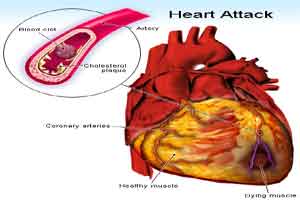- Home
- Editorial
- News
- Practice Guidelines
- Anesthesiology Guidelines
- Cancer Guidelines
- Cardiac Sciences Guidelines
- Critical Care Guidelines
- Dentistry Guidelines
- Dermatology Guidelines
- Diabetes and Endo Guidelines
- Diagnostics Guidelines
- ENT Guidelines
- Featured Practice Guidelines
- Gastroenterology Guidelines
- Geriatrics Guidelines
- Medicine Guidelines
- Nephrology Guidelines
- Neurosciences Guidelines
- Obs and Gynae Guidelines
- Ophthalmology Guidelines
- Orthopaedics Guidelines
- Paediatrics Guidelines
- Psychiatry Guidelines
- Pulmonology Guidelines
- Radiology Guidelines
- Surgery Guidelines
- Urology Guidelines
New tool predicts risk of heart attack in older surgery patients

A tool designed to more accurately predict the risk of heart attack in older patients undergoing non-cardiac surgery works significantly better than traditional risk assessment tools. By having more accurate information, older patients and their physicians can make an informed decision on whether to undergo surgery, UCLA researchers concluded.
In adults who undergo inpatient surgery, the mortality rate for those patients who experience cardiac arrest after surgery is 65 percent and is about 15 to 25 percent for those who have a heart attack. Estimating the risk of cardiac complications is an important step in deciding if a person is healthy enough to undergo an operation. However, the current predictive tools are designed for patients of all ages and do not take into account the higher risks in older people.
The researchers sought to develop a predictive tool that would be especially useful for patients 65 and older. It was based on the concept that older patients respond to risk factors differently than younger patients and these risk factors weigh differently across the age spectrum. Researchers tested this theory with existing tools and found they underestimated actual cardiac risk in older patients. They determined the accurate weight of each risk factor by age and selected the most important factors for this age group. The researchers then developed and tested the new risk predictive tool.
With a growing geriatric population and a projected increase in non-cardiac and elective surgeries, this tool called the "Geriatric-Sensitive Perioperative Cardiac Risk Index," can offer accurate estimates of the cardiac risks for these patients. The researchers hope to improve the predictive models for older patients in future studies.

Disclaimer: This site is primarily intended for healthcare professionals. Any content/information on this website does not replace the advice of medical and/or health professionals and should not be construed as medical/diagnostic advice/endorsement or prescription. Use of this site is subject to our terms of use, privacy policy, advertisement policy. © 2020 Minerva Medical Treatment Pvt Ltd